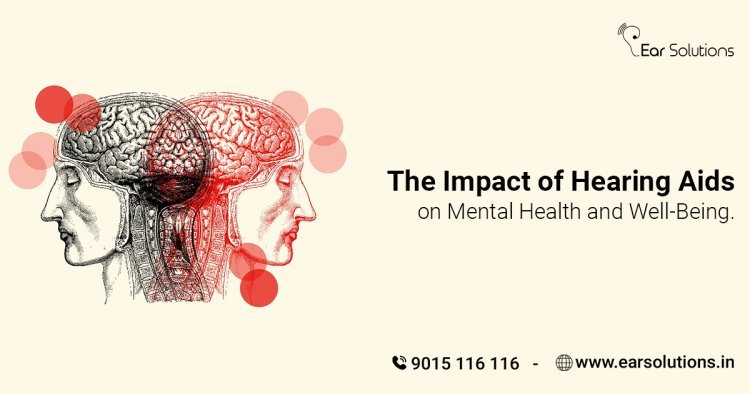The Impact of Hearing Aids on Mental Health and Well-Being
Hearing loss can significantly impact one's ability to communicate, socialize, and enjoy daily activities. When it comes to hearing aids, many people wonder whether they should wear one or two devices.

Hearing loss is a common condition, especially among older adults, that can significantly impact various aspects of life. Beyond the obvious communication difficulties, untreated hearing loss can lead to social isolation, depression, anxiety, and even cognitive decline. However, the introduction of hearing aids can dramatically improve not only hearing ability but also overall mental health and well-being. This blog explores the profound impact hearing aids can have on mental health and quality of life.
The Connection Between Hearing Loss and Mental Health
Hearing loss can have a cascading effect on mental health. When individuals struggle to hear and understand conversations, they may begin to withdraw from social activities and interactions, leading to feelings of isolation and loneliness. This social withdrawal can, in turn, contribute to depression and anxiety. Additionally, the cognitive strain of trying to hear and interpret sounds can lead to mental fatigue and reduced cognitive function over time.
How Hearing Aids Improve Mental Health
Enhanced Communication and Social Engagement
One of the primary benefits of hearing aids is the restoration of effective communication. By amplifying sounds and improving clarity, hearing aids enable individuals to participate more fully in conversations and social activities. This increased engagement helps combat feelings of isolation and fosters a sense of belonging and connection with others.
Reduction in Depression and Anxiety
Studies have shown that individuals who use hearing aids experience a significant reduction in symptoms of depression and anxiety. By improving the ability to communicate and engage socially, hearing aids help alleviate the emotional distress associated with hearing loss. Users often report feeling more confident and less anxious in social situations, which contributes to overall emotional well-being.
Improved Cognitive Function
Untreated hearing loss can lead to cognitive decline due to the increased mental effort required to process sounds and speech. Hearing aids reduce this cognitive load, allowing the brain to function more efficiently. Improved hearing can lead to better memory, attention, and overall cognitive function, reducing the risk of cognitive decline and dementia.
Enhanced Quality of Life
The overall quality of life improves significantly for individuals using hearing aids. With better hearing, they can enjoy everyday activities such as watching TV, listening to music, and participating in hobbies without difficulty. This enhanced enjoyment and participation in life’s pleasures contribute to a more positive outlook and greater life satisfaction.
Increased Independence and Safety
Hearing aids also contribute to a greater sense of independence and safety. Being able to hear environmental sounds, such as alarms, traffic, and conversations, allows individuals to navigate their surroundings more confidently and safely. This increased independence can lead to a more active and fulfilling lifestyle.
Overcoming Barriers to Hearing Aid Use
Despite the clear benefits, many individuals with hearing loss are hesitant to use hearing aids due to various barriers such as cost, stigma, or misconceptions about their effectiveness. Here are some ways to overcome these barriers:
Education and Awareness: Increasing awareness about the benefits of hearing aids and addressing common misconceptions can encourage more people to seek help for their hearing loss.
Accessible Solutions: Offering affordable and accessible hearing aid options can help mitigate the financial barriers that prevent individuals from getting the help they need.
Supportive Environments: Creating a supportive environment where individuals feel comfortable discussing their hearing loss and seeking treatment can reduce the stigma associated with hearing aids.
Conclusion
Hearing aids play a crucial role in improving not just hearing but also the mental health and overall well-being of individuals with hearing loss. By enhancing communication, reducing social isolation, and alleviating symptoms of depression and anxiety, hearing aids can lead to a more active, engaged, and fulfilling life. If you or a loved one is experiencing hearing loss, consider the profound benefits that hearing aids can offer and consult with a hearing care professional at Ear Solutions hearing aid clinic in Bangalore to explore the best options for your needs. Embracing the use of hearing aids can be a transformative step toward better mental health and a higher quality of life.
What's Your Reaction?










![Blog Submission Sites 2024 [High DA]](https://blognow.co.in/uploads/images/202306/image_100x75_6494a03eaff5e.jpg)
![Article Submission Sites 2023 [High DA & PA]](https://blognow.co.in/uploads/images/202307/image_100x75_64c4181f17036.jpg)
![Classified Submission Sites 2023 [High DA & PR]](https://blognow.co.in/uploads/images/202306/image_100x75_649dcd5260808.jpg)




![Article Submission Sites 2023 [High DA & PA]](https://blognow.co.in/uploads/images/202307/image_750x415_64c4181f08ed5.jpg)
![Classified Submission Sites 2023 [High DA & PR]](https://blognow.co.in/uploads/images/202306/image_750x415_649dcd5247eeb.jpg)
![Blog Submission Sites 2024 [High DA]](https://blognow.co.in/uploads/images/202306/image_750x415_6494a03e96bfa.jpg)